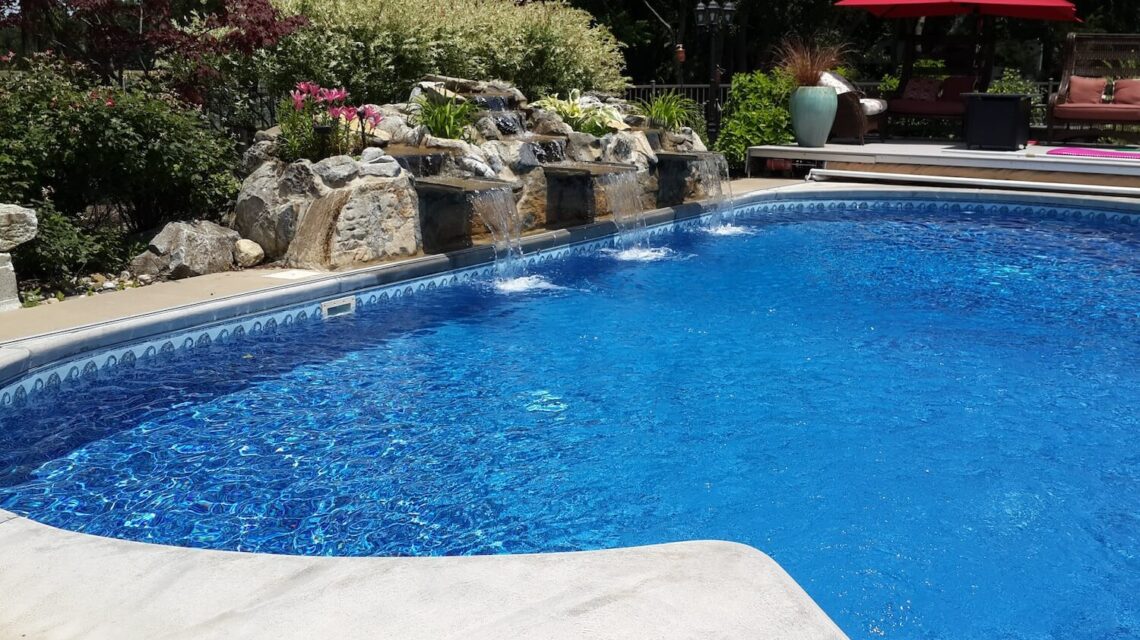When it comes to maintaining a swimming pool, one of the most important decisions you’ll make is choosing between a saltwater system and a chlorine-based system. Both options are popular for residential and commercial pools alike, and each offers its own set of advantages and drawbacks. However, choosing the right system for your lifestyle depends on various factors, including cost, maintenance, water quality, skin sensitivity, and the level of convenience you’re seeking.
In this article, we’ll explore the pros and cons of both saltwater and chlorine pool systems, and provide insights to help you make an informed decision for your swimming experience. Additionally, we’ll discuss the role of professional pool renovations and how upgrading your existing pool system to one that fits your lifestyle can enhance your overall pool experience.
Understanding the Basics
Before diving into the differences between saltwater and chlorine systems, it’s essential to understand the basics of how each works.
Chlorine Pools
A traditional chlorine pool uses liquid chlorine, chlorine tablets, or granular chlorine to disinfect the pool water. Chlorine is added to the water to kill harmful bacteria, algae, and other microorganisms. Typically, the chlorine needs to be manually added or maintained through a pool chlorinator or automatic chlorine feeder.
Saltwater Pools
Saltwater pools are chlorine pools, but they generate their chlorine through an electrolytic process. Instead of adding chlorine directly, a saltwater pool uses a salt chlorine generator (salt cell) that converts salt into chlorine through electrolysis. The salt concentration in a saltwater pool is much lower than seawater, typically around 3,000 to 4,000 parts per million (ppm). This low concentration of salt provides an effective sanitation system without the need to add chlorine directly.
Pros of Saltwater Pools
- Softer Water: One of the most significant benefits of saltwater pools is the softer water. The process of salt being converted to chlorine creates a more balanced, less harsh pool environment. Many swimmers report that saltwater feels smoother and gentler on their skin and eyes compared to the more intense sting of traditional chlorine.
- Lower Chemical Costs: Although the upfront cost of installing a saltwater system may be higher due to the salt chlorine generator, over time, you may save money on chemicals. Saltwater systems require less maintenance in terms of adding chlorine and stabilizers, which can reduce your chemical purchases.
- Automatic Chlorine Generation: With a saltwater pool, you don’t have to worry about manually adding chlorine to the water. The chlorine generator does this automatically, which makes pool maintenance much easier. The system constantly produces chlorine, keeping the water sanitized and safe without the need for regular chemical adjustments.
- Gentler on Skin and Hair: Saltwater pools are often preferred by individuals with sensitive skin or hair. The lower levels of chlorine and the presence of salt can be less irritating, leading to fewer rashes, dry skin, and damaged hair. Swimmers with eczema or other skin conditions often find saltwater pools more comfortable.
- Lower Pool Maintenance: Saltwater pools typically require fewer chemicals and less frequent testing compared to chlorine pools. The chlorine generator helps maintain a more consistent chlorine level, which means you won’t need to test or adjust the pool water as often.
- Environmentally Friendly: The natural process of converting salt into chlorine is seen as more environmentally friendly since it reduces the need for transporting and handling chemical chlorine. Additionally, saltwater pools may have less of an environmental impact when it comes to disposal because they don’t rely on harsh chemical treatments.
Cons of Saltwater Pools
- Higher Initial Cost: Saltwater pools generally have a higher upfront installation cost compared to chlorine pools. The salt chlorine generator and its associated equipment can be expensive. While you’ll save on chemicals in the long term, the initial investment can be a deterrent for some pool owners.
- Regular Maintenance of Salt Chlorine Generator: While a saltwater system reduces the need for frequent chemical purchases, it does require regular maintenance of the salt chlorine generator. The salt cell needs to be cleaned and replaced periodically, depending on usage and the quality of the water.
- Corrosion Risk: Saltwater is corrosive by nature, and over time, it can cause wear and tear on pool equipment, including heaters, ladders, and lights. Pool owners may need to replace parts more frequently than those with chlorine pools, and the saltwater environment requires additional protective measures for pool materials.
- Requires Monitoring Salt Levels: Although the chlorine generator produces chlorine automatically, salt levels must be carefully monitored to ensure the system is functioning properly. If salt levels get too low or too high, the chlorine generator may not operate efficiently.
Pros of Chlorine Pools
- Lower Initial Cost: Traditional chlorine pools are less expensive to install. You don’t need to invest in a salt chlorine generator or other complex equipment, making chlorine pools a more budget-friendly option upfront. The system consists of simple chlorinators, which makes it easier to set up.
- More Control Over Chlorine Levels: With a chlorine pool, you have complete control over how much chlorine is added to the water. If you need to boost the chlorine level for any reason, you can add more chlorine manually. This is ideal for pool owners who want more control over the exact chemical balance in their pool.
- No Salt Corrosion: Unlike saltwater pools, chlorine pools do not have the same risk of corrosion associated with salt. If your pool uses traditional chlorine, you don’t have to worry about the salt causing damage to pool equipment, fixtures, and surfaces.
- Wide Availability of Chemicals: Chlorine is readily available at most pool supply stores, making it easy to purchase and replace when necessary. With a chlorine pool, you’re not dependent on a specialized salt chlorine generator or the need for specific salt types.
Cons of Chlorine Pools
- Frequent Chemical Adjustments: One of the biggest downsides of chlorine pools is the need for regular chemical adjustments. You’ll need to add chlorine tablets, liquid chlorine, or granular chlorine on a routine basis to maintain proper water sanitation. Additionally, stabilizers, pH adjusters, and algaecides are often required to maintain ideal water conditions.
- Stronger Chemicals: Chlorine pools tend to use harsher chemicals that can cause skin and eye irritation. Swimmers often experience red eyes and dry skin after a chlorine swim, and people with sensitive skin may find chlorine pools uncomfortable or even harmful.
- Higher Long-Term Chemical Costs: Although chlorine pools are cheaper to install, the ongoing cost of purchasing chlorine and other chemicals can add up over time. These costs can be significant, particularly if you need to purchase stabilizers, pH balancers, and other pool chemicals.
- Inconsistent Chlorine Levels: With chlorine pools, maintaining a consistent chlorine level can be challenging. Rain, debris, and sunlight can all affect the chlorine levels in your pool, requiring regular testing and adjustments. If the chlorine level is too low, the water can become unsafe for swimming.
Professional Pool Renovations: Upgrading Your Pool System
As you consider your options between saltwater and chlorine pool systems, it’s important to factor in the possibility of a pool renovation. Whether you’re installing a new pool or upgrading an existing one, professional pool renovations can be a fantastic way to transform your swimming experience.
1. Why Consider Pool Renovations?
A pool renovation can not only improve the aesthetics and functionality of your pool, but it can also help you make the most of newer pool technologies, such as saltwater systems or more efficient chlorine systems. Renovations are an ideal solution if you’re not happy with your current pool’s performance or if you want to upgrade to a more modern, low-maintenance system that suits your lifestyle.
2. Saltwater System Installation
If you’re considering upgrading to a saltwater system, professional pool renovations are a smart choice. A reputable pool company can install a saltwater chlorine generator and configure your existing pool to be compatible with the new system. This may involve upgrading the filtration system and ensuring that all components, including the pool pump and saltwater system, are working in harmony. Many pool contractors also provide service packages that include regular maintenance, ensuring that your saltwater pool continues to operate efficiently.
3. Converting from Chlorine
For those who currently own a chlorine pool but are interested in switching to saltwater, a professional renovation team can help with the conversion. This typically involves installing the salt chlorine generator, adjusting your pool’s plumbing and filtration system, and determining the proper amount of salt to introduce into the pool. Converting to saltwater is a great option for homeowners who are looking for lower chemical costs and a gentler swimming experience.
4. Pool Resurfacing and Aesthetic Upgrades
Beyond the chemical system, pool renovations can improve the overall aesthetics and functionality of your pool. If your pool’s surface is worn, cracked, or stained, resurfacing is an essential part of your renovation. This provides an opportunity to update the appearance of your pool, whether you want to switch to a modern plaster finish, pebble tech, or another option. Professional renovators can also install additional features like LED lighting, waterfalls, or tile mosaics to enhance the visual appeal.
5. Advanced Automation and Smart Pool Systems
One of the best reasons to invest in a professional pool renovation is to take advantage of smart pool technology. Many modern pools come with automated systems that can monitor water quality, adjust chemical levels, and even control pumps and heaters remotely through a smartphone app. Professional pool contractors can help integrate these systems into your pool, allowing you to have better control over your pool’s performance and maintenance needs.
Conclusion
Choosing the right pool system—whether saltwater or chlorine—depends on your preferences and priorities. While saltwater pools offer many benefits, including lower chemical costs and gentler water, traditional chlorine pools remain a reliable and cost-effective option for pool owners who value control and simplicity. If you’re considering a change or upgrade, professional pool renovations can provide you with an efficient, modern system that enhances your enjoyment, reduces maintenance, and increases the value of your pool.
A professional pool renovation company can help you make an informed decision about which system is best for your needs, and can expertly handle the installation and maintenance to ensure your pool stays in top condition for years to come. Whether you’re upgrading to a saltwater system, resurfacing your pool, or installing advanced automation, expert pool services can make the process seamless and stress-free.




